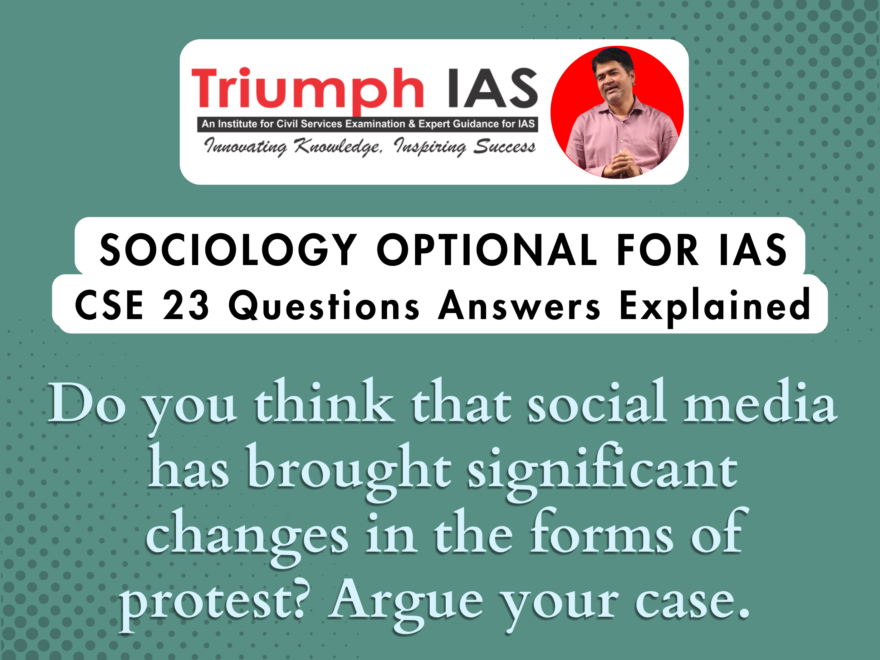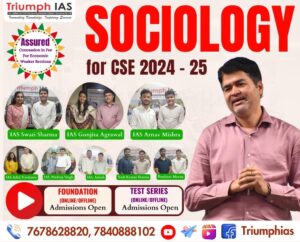Do you think that social media has brought significant changes in the forms of protest? Argue your case.
Section: B.
Sociology Paper 2023 Analysis.
Relevant for Paper-1 : Unit 7 Politics and society: protest
Question- 7 (B):Do you think that social media has brought significant changes in the forms of protest? Argue your case. (20 Marks)
|
Introduction: Explain social media activism redefining protest dynamics like online protest, social media activism Main Body: Explain changes by exploring both functional and non-functional dimensions Conclusion: Highlighting significance of social media despite criticism. |
Introduction
Social media has undeniably brought significant changes in the forms of protest. The use of social media as a tool for activism and protest has become increasingly prevalent, with platforms like Twitter, Facebook, and Instagram being used to mobilize, organize, and raise awareness for various causes. This form of online protest, often referred to as social media activism or hashtag activism, involves the use of hashtags, posts, and campaigns to promote awareness of social justice issues and show solidarity.
Main Body
Social media has brought significant changes in the forms of protest. It has presented both functional and dysfunctional changes explained below:
Functional Changes:
- Mass Mobilization: Social media platforms have revolutionized the way people mobilize for protests. The ease of communication and information dissemination allows for the rapid mobilization of large groups of people across geographical locations . This is supported by the views of Ahlqvist and Halonen , who asserted that social media, a crucial communication tool, plays a pivotal role in our lives, facilitating the expression of ideas, sharing of views, shaping opinions, and connecting individuals and society.
- Democratisation of Protest: Social media has democratized the protest process, making it inclusive and accessible to anyone with internet access. It has eliminated traditional barriers to entry, such as physical presence and resource requirements. It can be said that social movements are breaking free from traditional hierarchical structures.
- For instance the movement “ India against corruption” become nationwide movement due to use of social media
- Difficult to Suppress: Traditional forms of protest were often easier for authorities to control or suppress. With social media, protesters can quickly adapt and change tactics, making it more challenging for authorities to predict or counteract movements.
- Leaderless Movements: Social media enables leaderless movements where individuals can organize and participate without a central figure. This can make it more resilient to suppression since there is no single person to target.
-
- The Black Lives Matter movement gained significant momentum through social media. The hashtag #BlackLivesMatter became a rallying cry for protestor’s across the globe, though there was no central leading authority was present.
- Regional Barriers Removed: Social media provides a platform for global solidarity. People from different regions can share experiences, resources, and strategies, breaking down regional barriers and fostering a sense of interconnectedness.
-
- For instance: The Arab Spring was a series of anti-government protests, uprisings, and armed rebellions that spread across much of the Arab world with use of social media.
- Empowerment of Vulnerable and Marginalized Sections: Social media gives a voice to marginalized and vulnerable communities who might not have access to traditional forms of media. It allows them to share their stories and grievances, fostering inclusivity.
- For instance #me too movement
- Accessibility to Elites: Social media provides a direct channel for communication between activists and influential individuals or elites. This can be a powerful tool for advocacy and raising awareness among decision-makers.
Dysfunctional Changes:
- Fake News: Philo and Beattie argue that moral panics often arise because of negative media representations of issues such as immigration and asylum seekers. Sometimes such moral panics can lead to violent outrages based on even fake news.
- State Control and Surveillance: Governments can exploit social media for surveillance and control of protests. Monitoring online activities allows authorities to identify and target activists, potentially leading to repression.
- Political Instability: Social media can contribute to political instability by amplifying extremist views and facilitating the rapid spread of rumours. This can lead to increased tensions and conflict within societies.
- Echo Chambers: Social media algorithms tend to create echo chambers, where users are exposed to information that aligns with their existing beliefs. This can reinforce polarization and hinder constructive dialogue between opposing sides.
- Surveillance and Counter-Protest: Conversely, social media can be employed by authorities for monitoring and responding to protests. Governments have the capability to observe social media platforms to identify protestors, monitor their actions, and disseminate misinformation with the aim of undermining the legitimacy of the protest.
- Polarization: While social media can connect like-minded individuals, it can also contribute to polarization as people engage less with diverse perspectives, leading to increased ideological divides.
- The Marxist cultural effects model: it sees social media as very powerful ideological influence, mainly concerned with ideological influence. It may be considered as a source of power inequalities.
- Baudrillard’s hyper-reality: he posits that in contemporary society, media representations have become so prevalent and influential that they no longer merely reflect reality but actively shape and blur the boundaries between representation and actuality.
Consequences
- Economic Implications: The reverse migration during the COVID-19 pandemic affected the recovery of economic activity in cities after the lifting of lockdown, as many migrant workers returned to their native villages, affecting the labor force and economic growth.
- Social Implications:
-
- Reverse migration can strengthen family and community ties, as individuals return to their hometowns and reconnect with their roots. This can contribute to social cohesion and community development.
- Returning to their villages, migrant workers faced problems in commuting and quarantine. Some of these workers found jobs in MGNREGA work and some in local industries, while others faced issues in family relations and domestic violence.
- Policy Implications: The condition of migrant workers during the COVID-19 pandemic revealed that workers are inadequately protected by social security measures. Provisions of medical insurance and unemployment or layoff benefits measures need to be universalized.
- Cultural Syncretism: Reverse migrants bring elements of urban culture into rural environments. This infusion of urban influences has resulted in a fusion of urban and rural cultures in villages, particularly evident in states like Bihar and Uttar Pradesh in India.
Conclusion
The impact of social media on protests is multifaceted and depends on how these platforms are used and regulated. Despite it’s criticisms, social media has undoubtedly changed the landscape of protest and activism, providing a powerful platform for individuals and movements to amplify their voices and effect change.
Related Blogs…
 |
 |

To master these intricacies and fare well in the Sociology Optional Syllabus, aspiring sociologists might benefit from guidance by the Best Sociology Optional Teacher and participation in the Best Sociology Optional Coaching. These avenues provide comprehensive assistance, ensuring a solid understanding of sociology’s diverse methodologies and techniques.
META TAGS:
Taylorism, Scientific Management, Frederick Taylor, Efficiency, Standardization, Specialization, Worker Exploitation, Organizational Hierarchy, Merits and Demerits, Contemporary Organizational Functioning, Sociology Question Paper, Sociology Question Paper 2023, Sociology Question Paper CYQ, Sociology Question Paper UPSC, What is Taylorism? Analyze its merits and demerits.
Why Vikash Ranjan’s Classes for Sociology?
Proper guidance and assistance are required to learn the skill of interlinking current happenings with the conventional topics. VIKASH RANJAN SIR at TRIUMPH IAS guides students according to the Recent Trends of UPSC, making him the Best Sociology Teacher for Sociology Optional UPSC.
At Triumph IAS, the Best Sociology Optional Coaching platform, we not only provide the best study material and applied classes for Sociology for IAS but also conduct regular assignments and class tests to assess candidates’ writing skills and understanding of the subject.
Choose The Best Sociology Optional Teacher for IAS Preparation?
At the beginning of the journey for Civil Services Examination preparation, many students face a pivotal decision – selecting their optional subject. Questions such as “which optional subject is the best?” and “which optional subject is the most scoring?” frequently come to mind. Choosing the right optional subject, like choosing the best sociology optional teacher, is a subjective yet vital step that requires a thoughtful decision based on facts. A misstep in this crucial decision can indeed prove disastrous.
Ever since the exam pattern was revamped in 2013, the UPSC has eliminated the need for a second optional subject. Now, candidates have to choose only one optional subject for the UPSC Mains, which has two papers of 250 marks each. One of the compelling choices for many has been the sociology optional. However, it’s strongly advised to decide on your optional subject for mains well ahead of time to get sufficient time to complete the syllabus. After all, most students score similarly in General Studies Papers; it’s the score in the optional subject & essay that contributes significantly to the final selection.
“A sound strategy does not rely solely on the popular
Opinion of toppers or famous YouTubers cum teachers.”
It requires understanding one’s ability, interest, and the relevance of the subject, not just for the exam but also for life in general. Hence, when selecting the best sociology teacher, one must consider the usefulness of sociology optional coaching in General Studies, Essay, and Personality Test.
The choice of the optional subject should be based on objective criteria, such as the nature, scope, and size of the syllabus, uniformity and stability in the question pattern, relevance of the syllabic content in daily life in society, and the availability of study material and guidance. For example, choosing the best sociology optional coaching can ensure access to top-quality study materials and experienced teachers. Always remember, the approach of the UPSC optional subject differs from your academic studies of subjects. Therefore, before settling for sociology optional, you need to analyze the syllabus, previous years’ pattern, subject requirements (be it ideal, visionary, numerical, conceptual theoretical), and your comfort level with the subject.
This decision marks a critical point in your UPSC – CSE journey, potentially determining your success in a career in IAS/Civil Services. Therefore, it’s crucial to choose wisely, whether it’s the optional subject or the best sociology optional teacher. Always base your decision on accurate facts, and never let your emotional biases guide your choices. After all, the search for the best sociology optional coaching is about finding the perfect fit for your unique academic needs and aspirations.
Follow us :
🔎 https://www.instagram.com/triumphias
🔎 https://www.youtube.com/c/TriumphIAS
🔎 https://t.me/VikashRanjanSociology
Find More Blogs…
| Compare and contrast Karl Marx’s and Max weber’s | Karl Marx- Historical Materialism |
| Position of Women In the Modern Indian Society | Sociology: Social system and pattern variables |
KEYWORD: Reverse Migration,Reverse Migration,Reverse Migration,Reverse Migration,Reverse Migration,Reverse Migration,Reverse Migration,Reverse Migration,Reverse Migration,Reverse Migration,Reverse Migration,Reverse Migration,Reverse Migration,Reverse Migration,Reverse Migration,Reverse Migration,Reverse Migration,



